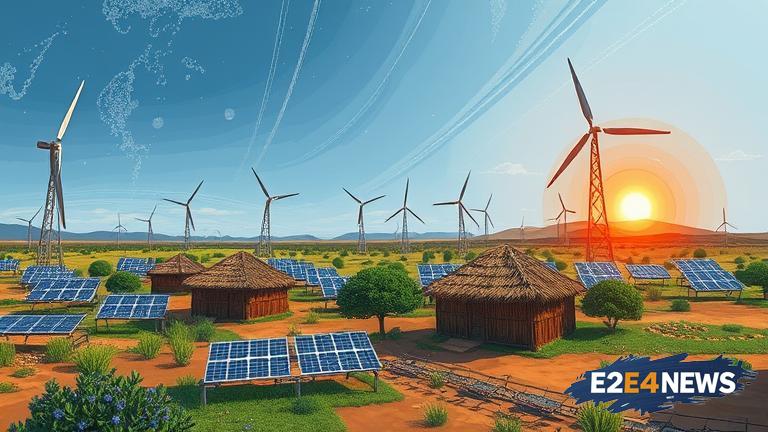Africa is undergoing a significant transformation in its energy landscape, with a growing focus on renewable energy sources. The continent is rich in solar and wind resources, making it an ideal location for the development of renewable energy projects. In recent years, there has been a surge in investment in the renewable energy sector, with many countries committing to increase their use of clean energy. South Africa, for example, has set a target of generating 20% of its electricity from renewable sources by 2030. Similarly, Morocco has announced plans to generate 52% of its electricity from renewable sources by 2030. The use of renewable energy is not only beneficial for the environment, but it also has the potential to create jobs and stimulate economic growth. In fact, a report by the International Renewable Energy Agency (IRENA) found that the renewable energy sector could support up to 24 million jobs globally by 2030. Africa is well-positioned to take advantage of this trend, with many countries having an abundance of renewable energy resources. The cost of renewable energy is also decreasing, making it more competitive with fossil fuels. This has led to an increase in the adoption of renewable energy technologies, such as solar panels and wind turbines. In addition, many African countries are implementing policies to support the development of renewable energy, such as tax incentives and feed-in tariffs. The African Union has also launched the Africa Renewable Energy Initiative, which aims to accelerate the development of renewable energy on the continent. The initiative has set a target of generating at least 300 gigawatts of renewable energy by 2030. To achieve this goal, the African Union is working with international partners to mobilize funding and technical support for renewable energy projects. The use of renewable energy is also having a positive impact on energy access in Africa. Many communities that were previously without access to electricity are now being connected to the grid through renewable energy projects. This is not only improving their quality of life, but it is also providing them with access to modern energy services. Furthermore, the use of renewable energy is helping to reduce greenhouse gas emissions and mitigate the impacts of climate change. Africa is particularly vulnerable to the impacts of climate change, and the use of renewable energy is an important step towards reducing the continent’s carbon footprint. In conclusion, Africa’s renewable energy revolution is gaining momentum, with many countries committing to increase their use of clean energy. The use of renewable energy has the potential to create jobs, stimulate economic growth, and improve energy access, while also reducing greenhouse gas emissions and mitigating the impacts of climate change. As the continent continues to develop its renewable energy sector, it is likely that we will see significant progress in the coming years. The future of energy in Africa is looking bright, with renewable energy playing an increasingly important role. With the right policies and investments in place, Africa can unlock its vast renewable energy potential and create a sustainable energy future for generations to come. The benefits of renewable energy are numerous, and it is essential that African countries continue to prioritize the development of this sector. By doing so, they can create a better future for their citizens and contribute to a more sustainable global energy system. The growth of the renewable energy sector in Africa is a positive trend that is expected to continue in the coming years. As the continent continues to develop its energy infrastructure, it is likely that we will see an increase in the use of renewable energy sources. This will not only benefit the environment, but it will also have a positive impact on the economy and society as a whole.
